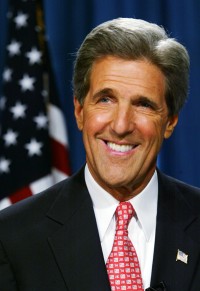John Kerry delivered a speech in Copenhagen yesterday. It was inspiring, but look past the uplift and it reveals just how tricky the path forward will be.
Here’s the needle Obama and Kerry are trying to thread:
 1. Copenhagen talks end in substantial political agreement.
1. Copenhagen talks end in substantial political agreement.
That means developed countries will need to offer enough financing money — and a reasonable plan for ramping the amount up over time — to pull developing nations on board, but not so much that our backwards, xenophobic Senate rebels. (On that note, U.S. Ag Secretary Tom Vilsack announced yesterday that the U.S. will put $1 billion toward preserving tropical forests, a welcome bit of good news.)
It means China will have to agree to fairly robust transparency measures, to insure that the policies it is pledging, and their effects on emissions, are “measurable, reportable, and verifiable” (MRV, in the lingo). China is not much of a fan of having independent agencies in its country reporting on its business, but without confidence that China is getting serious, the U.S. Senate won’t act. Or it will act and impose carbon border tariffs, which would absolutely explode U.S./China relations.
Meanwhile, in his attempts to broker an agreement, Obama is constrained by not being entirely sure what pledges the Senate will support, so he has to be conservative (“in the range of 17% by 2020,” for example). Conservatism, however, is not what small island states and poorest nations are looking for.
All I’m hearing from people on the ground is that things are falling apart. There’s a chance Hu and Obama can ride in to save the day on Friday, but it’s looking like it will require quite a feat of statesmanship at this point.
2. The U.S. Senate passes a reasonably strong climate/energy bill this Spring
No need to rehearse again how difficult this will be. Kerry says there are more than 60 votes in play, and he told the assembled at Copenhagen that “the naysayers predicting defeat are wrong.” But in an interview later, he wasn’t even willing to say firmly that the resulting bill would still involve a cap-and-trade system. It sounds, in other words, like everything is up for grabs, and with Republicans united in opposition, that means every single Democrat will be able to dictate the terms of the bill. That sounds like a recipe for a subsidy-laden piece of crap, pardon my French.
It’s bad for domestic policy, but it could also be bad for the international process. If countries sign a political agreement with the U.S. this week, they’ll expect it to stick at least to Obama’s mild promises: “in the range of 17%” by 2020 and a few billion for developing countries. If the Senate bill lacks those provisions, or if it includes carbon tariffs (poison for China), it could derail the final act, which is …
3. COP16, in Mexico City, finishes the work of Copenhagen with a final, comprehensive, legally binding treaty
If the Copenhagen agreement leads to a bill passing the U.S. Congress, that in turn could reassure other countries that the U.S. is serious and fortify their will to hammer out the final details of a legally binding treaty in Mexico City. That treaty would, if all goes well, lock in binding emission reduction targets for all major emitters (including China), open both developed and developing countries to a high degree of transparency, and lock in large-scale, long-term financing for developing countries. Whee!
As you can see, this is quite a high-wire act. Everything will have to go exactly right to get past these three barriers. It will not surprise you to hear that I view the Senate as the primary obstacle. (It’s easier to get 192 countries to agree than 60 egotistical windbags.)
In his speech in Copenhagen, Al Gore advocated that the Senate set a deadline of April 22 (Earth Day) for passing a bill, and that the Mexico City meeting be moved up to July (to avoid the U.S. mid-terms). That is … wildly ambitious. I will be surprised, given the health care reform fiasco, the political imperative for a jobs bill, and the need to pass fiscal reform, whether the bill even makes it to the Senate floor by April.
You know what would help? If the extraordinary youth movement that has shown its strength in Copenhagen would travel, en masse, to Washington D.C. the day the talks end, and start marching. Start doing sit-ins in Ben Nelson’s office. Set up camp on the mall and stay there until a bill is passed. Relative to the pressure that’s been brought to bear on Obama and the other nations in Copenhagen, the Senate has felt virtually none. Make them sweat!
Spread the news on what the føck is going on in Copenhagen with friends via email, Facebook, Twitter, or smoke signals.





